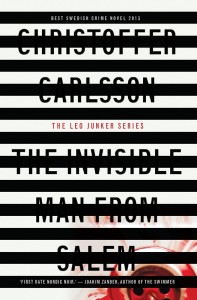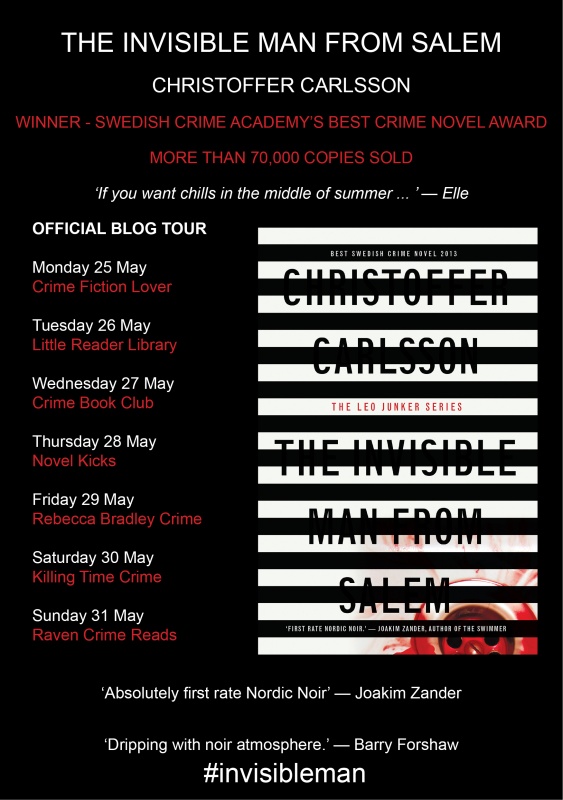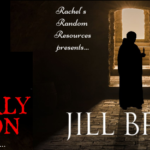Blog Tour: The Invisible Man From Salem by Christoffer Carlsson
I’m very pleased to be welcoming Christoffer Carlsson to Novel Kicks. To celebrate the release of his novel, The Invisible Man from Salem (published in the UK by Scribe Books and translated by Michael Gallagher,) we will be taking part in the blog tour by reviewing the book but first, we had a chat with Christoffer about his novel, his favourite word and the three books he couldn’t live without…
Hi Christoffer. Can you tell us a little about The Invisible Man from Salem and it’s main character, Leo Junker. How did the idea originate?
The Invisible Man From Salem is part crime noir, part coming-of-age drama. It’s about two friends who come from the same place but grow to be very different people, and a story about the mysteries of friendship, love, guilt, and betrayal.
The idea really came from the work I was doing in criminology at the time. I was hired to write a PhD, based on life history interviews with a sample of juvenile delinquents born in Stockholm during the 1940s and 50s. As I began doing interviews with then in 2010, they were around 60 and had lived long and interesting lives. My interest was the field we call continuity and change in crime, that is, why did some of these juvenile offenders cease to do crime whereas others continued to offend well beyond the transition to adulthood? In other words, me interest was why some fare better than do others. As it turned out, some of the people who we – based on childhood risk factors – predicted would do bad, they did bad. But many of those we thought would do bad, actually turned out to live quite good lives. And, reversely, several of the people who we predicted would do good, actually lived quite crime-intensive lives. So, doing that work, it just got me thinking about what shapes a person’s life and, of course, the answer to that is very basic: it’s the relations we have to people and places, our location in the various dimensions of our social structure, and it is our own dreams and fears and aspirations.
I’m not claiming that I have written a criminological, fictionalized account of real lives or anything like that. I just wanted to write a crime drama based on the idea of what shapes people’s lives, and it was from it that the idea of the Leo Junker series grew.
What drew you to this genre?
Oh man, you know, I was born and bred on crime fiction. I’ve always loved it. The beauty in crime fiction is that it, when it’s done good, is much more than just a story about a crime. You know, much crime is the result of very basic dimensions of human existence. Love, friendship, greed, sex, guilt, betrayal, and various forms of drug use – all these things are very human things. But when they are taken to their extreme, the end result is sometimes crime. So when crime fiction is at its very best, it shows us what can happen when the most human elements in us go wrong. It tells us, in a sense, who we are and what we are capable of. I’m, by the way, not claiming that we are all equally prone to do murder or armed robberies; clearly, we’re not. But crime fiction can make us understand what is actually going on when such things do happen.
Which fictional place would you like to visit for the day?
That is a tricky question. I would have to say – and I know that this may be boring, especially for a UK audience – Hogwarts. The reason: the pensieve in Dumbledore’s office.
How much planning do you undertake before writing a book? Do you edit as you go?
I do some planning, but not a lot. I usually start writing right away, as soon as I have an idea, because there’s no way for me to tell whether or not the idea will work on paper. Then, of course, I do plan as I go along. In First Draft mode, I usually plow ahead but I do occasionally go back and do some editing here and there.
Do you write longhand or type?
I prefer longhand, actually. There’s something nice about physically putting your story down on paper. As you touch the paper, you can feel the words against the skin of your fingertips. I love that sensation. And also, since I write slower longhand, I choose my words more carefully. If you take a page from a first draft that I’ve written longhand and compare to another, typed page, the one written in longhand is much, much better. However, typing does have one big advantage: I can type approximately as fast as I can think, which makes the story emerge more intuitively and in a softer, gentler stream than when I write longhand. Now, that sounds as if I type very fast. I don’t. My thinking is really slow.
Do you have a favourite word?
I don’t, no. I don’t want to make the other words feel bad, so I just love them all equally.
If you could only own three books for the rest of your life, which three would you pick?
That’s a tough one. I would have to say … Okay, so I will limit myself to crime fiction, is that fair? Otherwise it’s impossible to list only three. Here we go:
American Tabloid – James Ellroy
Blackwater – Kerstin Ekman
The abominable man – Maj Sjöwall/Per Wahlöö
Which song would best describe you?
Ok, so, first thing that popped into my head was Bitch better have my money by Rihanna. I have no idea why, though, haha! Maybe a Bob Dylan song, like Ain’t talkin’ or Things have changed.
Who would you like to invite to a fantasy dinner party?
Oh wow, that’s a good one. There are so many icons that would be so cool to have dined with, you know? Swedish ones like Olof Palme, August Strindberg and Stieg Larsson, American literary icons such as J. D. Salinger, Patricia Highsmith and Dashiell Hammett … It would have to be a huge table. With lots of food.
Advice for new writers?
1. Write. You may claim that you write, think about writing during the day, read books or blogs on how to write, etc. etc. but what you really need to do is write. I know this sounds like a stupid piece of advice but for the average aspiring writer today, between jobs and friends, spouses and kids, it’s often difficult to find the time to write. You have to consciously make room to write. Try to make it a natural part of your daily routine, just as natural as brushing your teeth.
2. Write about what you know, but, even better, write about something that you do not yet know but wish to understand. It may be personal, social, or political, I don’t care, but whatever it is, something needs to be at stake. In my case, crime fiction, you have to entertain and be good at doing that, but the beauty of crime fiction is that the more engaged you are as a writer, the more engaged the reader will be as well.
3. Read. Read books, loads of them. Read the stuff that’s in your genre so you’re aware of how the field looks and what other people are doing, but importantly, also read stuff that’s not in your genre. If you only read crime fiction, chances are you’ll only write like everybody else. Read books that are good but, also, read books that suck. You usually learn more about what you want to do in the negative sense: I do not want to do it like that. It’s not a very nice thing to say, but it’s true.
4. Never take the easy way out of a scene. Good fiction is, to a surprisingly large extent, about never taking the easy way out of a scene.
5. Lie. But do it with elegance.
6. Control your characters. They are your slaves.
7. Trust your reader. S/he is probably smarter than you are. And your reader, by the way, is not your “audience”. S/he is not a friend, nor is s/he an enemy or someone you need to outsmart, outwit or win over. The reader, already from the first page, is your temporary lover.
 Our thoughts on The Invisible Man from Salem.
Our thoughts on The Invisible Man from Salem.
(Review by Christopher Parish.)
In the final days of summer, a young woman is shot dead in her apartment. Three floors above, the blue lights of the police cars awaken disgraced ex-officer Leo Junker. Though suspended from the force, he can’t stay away for long. Bluffing his way onto the crime scene, he examines the dead woman and sees that she is clasping a cheap necklace — a necklace he instantly recognises. As Leo sets out on a rogue investigation to catch the killer, a series of frightening connections emerge, linking the murder to his own troubled youth in Salem — a suburb of Stockholm where social and racial tensions run high — and forcing him to confront a long ago incident that changed his life forever.
Now, in backstreets, shadowed alleyways, and decaying suburbs ruled by Stockholm’s criminal underground, the search for the young woman’s killer and the truth about Leo’s past begins.
I really enjoyed The Invisible Man From Salem. The story centres around Leo Junker, a police officer working for Internal Affairs in Stockholm. When we meet him he is down on his luck, having been lumbered with the responsibility for a botched operation which left several people dead and left him reliant on medication and absinth to get through the day.
When a woman gets murdered in his building and his fingerprints are found on an item she was carrying, he is forced to pull himself together and is pulled back into being a detective as he sets out on his own to try to find the truth. The story was original and there were many twists and turns that meant I keep wanting to get to the end to find out what happened.
The narrative moves back and forth between Leo’s childhood years in Salem and the present day but does so in a way which feels natural and easy to read and that doesn’t slow the story down in any way. The writing is atmospheric and I was drawn in quickly to Leo’s world. Despite all of his issues, it is easy to empathise with Leo.
Leo is a complicated character who is down on his luck and as I progressed, I found myself intrigued by him and I look forward to reading the next books to see how his career progresses. I have quickly become a fan of the Leo Junker series.
The book is translated from the original Swedish by Michael Gallagher and I would be intrigued to read the original version to see how well the writing style is reflected.
Christoffer Carlsson was born and raised in Halmstad, on the west coast of Sweden. He earned his PhD in Criminology from the University of Stockholm where he currently serves as a lecturer. In 2012, he was awarded the International European Society of Criminology’s Young Criminologist Award. In 2013, Carlsson published his first novel in the series about troubled police officer Leo Junker. The Invisible Man From Salem (Den osynliga mannen från Salem) was named Best Swedish Crime Novel of the Year by the Swedish Crime Writers’ Academy in 2013, making Carlsson the youngest winner of the award ever. The book was also shortlisted for the prestigious Glass Key Award in 2014. The second installment in the series, The Falling Detective (Den Fallande Detectiven), was released in August 2014.
Christoffer is on Facebook: https://www.facebook.com/pages/Christoffer-Carlsson-Author
Check out the blog tour banner for other stops on the Invisible Man From Salem Blog Tour. It continues tomorrow over at Rebecca Bradley Crime.







Pingback: Book Review - THE INVISIBLE MAN FROM SALEM by Christoffer Carlsson